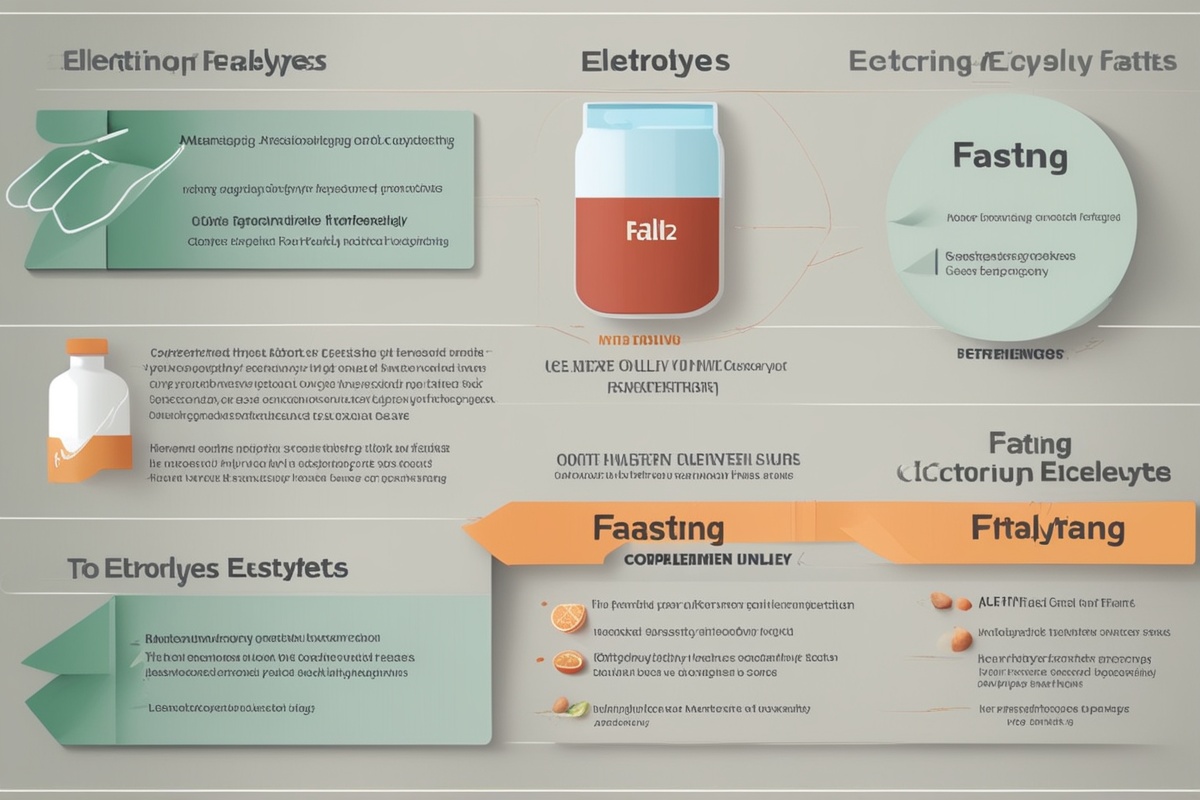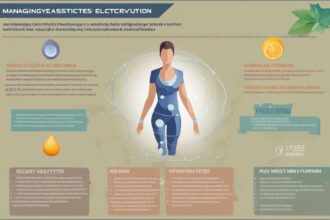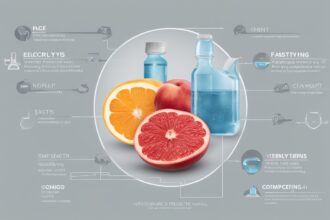Hey there, fellow fasting enthusiasts! If you’ve ever felt sluggish, dizzy, or just “off” during a fast, you might be overlooking a critical piece of the puzzle: electrolyte balance during fasting. Electrolytes are the unsung heroes of our body’s hydration and energy systems, and they play an even bigger role when you’re abstaining from food. Whether you’re doing intermittent fasting, a water fast, or an extended fast, keeping your electrolyte levels in check can make or break your experience. In this deep dive, we’ll explore what electrolytes are, why they matter during fasting, and how to maintain that perfect balance for optimal health and performance. Let’s get started!
What Are Electrolytes and Why Do They Matter?
Electrolytes are minerals in your body that carry an electric charge, helping regulate vital functions like hydration, muscle contractions, nerve signaling, and pH balance. The main players include sodium, potassium, magnesium, calcium, chloride, and bicarbonate. When you’re eating a regular diet, you naturally replenish these through food and drinks. But during fasting, when intake is limited or nonexistent, maintaining electrolyte balance while fasting becomes a challenge.
Why does this matter? Well, fasting—especially water or prolonged fasts—can lead to rapid water and mineral loss through urine, sweat, and even breath. This loss disrupts the delicate equilibrium of electrolytes, potentially causing symptoms like fatigue, headaches, muscle cramps, or even heart palpitations (Institute of Medicine, 2005). So, understanding how fasting impacts your body’s mineral levels is the first step to feeling your best.
How Fasting Affects Electrolyte Levels
When you fast, your body undergoes some fascinating changes. Without incoming calories, it shifts into a state of ketosis (for longer fasts), burning fat for fuel. This process, while beneficial for weight loss and mental clarity, also increases water loss as glycogen stores in your muscles and liver are depleted. Glycogen holds onto water, and when it’s used up, that water—and the electrolytes dissolved in it—gets flushed out (Volek & Phinney, 2011).
Sodium, in particular, takes a hit during fasting because your kidneys excrete more of it to maintain fluid balance. Potassium and magnesium levels can also dip, especially if you’re not supplementing or consuming electrolyte-rich fluids during eating windows. This imbalance can lead to the dreaded “keto flu” during intermittent fasting or low-carb diets, with symptoms mimicking electrolyte deficiency (Westman et al., 2007). Keeping tabs on electrolyte balance fasting strategies is key to avoiding these pitfalls.
Signs of Electrolyte Imbalance During Fasting
So, how do you know if your electrolytes are out of whack while fasting? Your body is pretty good at sending signals, but you’ve got to listen. Here are some common signs of imbalance to watch out for:
- Fatigue or Weakness: Low sodium or potassium can sap your energy, making you feel drained even without physical exertion.
- Muscle Cramps or Twitches: A lack of magnesium or calcium often shows up as painful cramps or involuntary muscle spasms.
- Headaches or Dizziness: Dehydration paired with low electrolytes can cause lightheadedness or brain fog.
- Irregular Heartbeat: Severe imbalances, especially in potassium, can affect heart rhythm—seek medical attention if this happens (WHO, 2012).
- Nausea or Irritability: Feeling queasy or on edge can signal your body’s struggling to maintain homeostasis.
If you’re experiencing these symptoms, don’t panic—just take it as a cue to reassess your approach to fasting and electrolyte balance. Let’s talk solutions next.
Practical Tips to Maintain Electrolyte Balance While Fasting
Balancing electrolytes during a fast doesn’t have to be complicated. With a few mindful habits, you can keep your levels stable and feel amazing throughout your fasting journey. Here are some actionable strategies tailored for fasters:
- Stay Hydrated with Electrolyte-Enhanced Water: Plain water is great, but adding a pinch of high-quality sea salt or an electrolyte powder (sugar-free, of course) can replenish sodium and other minerals. Aim for 2–3 liters daily, depending on activity level.
- Choose Bone Broth During Eating Windows: If you’re doing intermittent fasting, break your fast with bone broth. It’s rich in sodium, potassium, and magnesium, making it a perfect rehydration tool (Gunnars, 2018).
- Supplement Wisely: Consider a balanced electrolyte supplement with sodium, potassium, and magnesium. Avoid overdoing it—follow dosage guidelines to prevent gastrointestinal upset.
- Monitor Salt Intake: Don’t shy away from salt during fasting periods if you’re feeling symptoms of low sodium. A small amount in your water can work wonders.
Remember, everyone’s body responds differently to fasting. Start small, observe how you feel, and adjust your electrolyte fasting balance routine as needed. Always consult a healthcare provider if you have underlying conditions like kidney issues or hypertension before making drastic changes.
The Science Behind Electrolytes and Fasting Performance
Let’s nerd out for a minute and look at what science says about electrolyte balance during fasting. Research shows that maintaining proper hydration and mineral levels directly impacts fasting outcomes. For instance, a study on intermittent fasting found that participants who supplemented with electrolytes reported fewer side effects like fatigue and improved adherence to their fasting schedule (Trepanowski et al., 2017).
Moreover, electrolytes influence muscle function and recovery, which is crucial if you’re pairing fasting with exercise. Sodium and potassium help regulate fluid balance in cells, preventing dehydration-induced performance drops. Magnesium, often overlooked, supports over 300 biochemical reactions in the body, including energy production—something you’ll appreciate when fasting zaps your pep (Magnesium Research, 2011). So, prioritizing fasting electrolyte management isn’t just about avoiding discomfort; it’s about optimizing your body’s resilience.
Common Myths About Electrolytes and Fasting
There’s a lot of misinformation floating around about electrolytes and fasting, so let’s clear the air. One myth is that you don’t need to worry about electrolytes if you’re only doing short fasts (like 16:8 intermittent fasting). Not true—even short fasts can deplete sodium if you’re active or sweating a lot. Another misconception is that more salt is always better. Overloading on sodium without balancing potassium and magnesium can lead to bloating or blood pressure spikes in sensitive individuals (WHO, 2012).
Lastly, some folks think sports drinks are the go-to solution for electrolyte balance fasting. While they contain electrolytes, they’re often loaded with sugar, which can break your fast or spike insulin. Stick to zero-calorie options or natural sources like diluted coconut water (if within fasting rules). Busting these myths helps you make informed choices for a smoother fasting experience.
As we wrap up, let’s reflect on why electrolyte balance during fasting deserves your attention. Fasting is a powerful tool for health, weight management, and mental clarity, but it’s not without challenges. Electrolytes are the foundation of keeping your body humming along, even when food isn’t on the table. By staying hydrated, listening to your body, and using smart supplementation, you can sidestep common pitfalls and make the most of your fasting practice. Remember, it’s all about balance—pun intended! Keep experimenting, stay informed, and don’t hesitate to reach out to a professional if something feels off. Here’s to fasting smarter, not harder!
References
- Institute of Medicine. (2005). Dietary Reference Intakes for Water, Potassium, Sodium, Chloride, and Sulfate. National Academies Press.
- Volek, J. S., & Phinney, S. D. (2011). The Art and Science of Low Carbohydrate Living. Beyond Obesity LLC.
- Westman, E. C., Yancy, W. S., Mavropoulos, J. C., Marquart, M., & McDuffie, J. R. (2007). The effect of a low-carbohydrate, ketogenic diet versus a low-glycemic index diet on glycemic control in type 2 diabetes mellitus. Nutrition & Metabolism, 4, 36. https://doi.org/10.1186/1743-7075-5-36
- World Health Organization (WHO). (2012). Guideline: Sodium intake for adults and children. WHO Press.
- Trepanowski, J. F., Kroeger, C. M., Barnosky, A., Klempel, M. C., Bhutani, S., Hoddy, K. K., … & Varady, K. A. (2017). Effect of alternate-day fasting on weight loss, weight maintenance, and cardioprotection among metabolically healthy obese adults: A randomized clinical trial. JAMA Internal Medicine, 177(7), 930-938. https://doi.org/10.1001/jamainternmed.2017.0936
- Gunnars, K. (2018). Bone broth: How to make it and 6 reasons why you should. Healthline. Retrieved from https://www.healthline.com/nutrition/bone-broth






